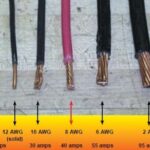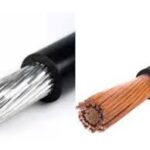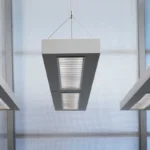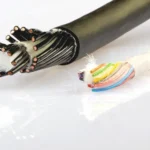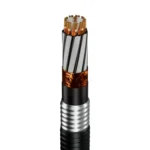Nuclear-grade cables are specially engineered to perform safely and reliably in nuclear power generation and radiation-intensive environments.
Designed to endure extreme temperature, pressure, chemical exposure, and radiation, these cables ensure continuous operation of critical systems in nuclear power plants, reactors, and research facilities.
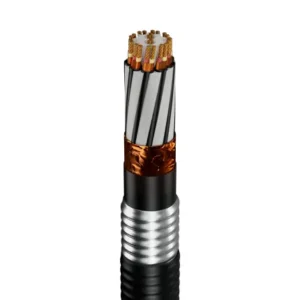
nuclear grade cable
Whether for control circuits, power transmission, or instrumentation, nuclear-grade cables meet the strictest international standards for safety, longevity, and signal integrity.
What Are Nuclear-Grade Cables?
Nuclear-grade (or granuclear) cables are high-performance electrical cables designed to operate under radiation exposure, high heat, and mechanical stress.
They are typically constructed using radiation-resistant insulation materials, flame-retardant sheaths, and non-toxic, halogen-free compounds to maintain performance and integrity during long-term service in nuclear environments.
Typical Construction
Conductor: Annealed copper or nickel-plated copper for superior conductivity and oxidation resistance
Insulation: Radiation-resistant compounds such as XLPE, EPR, PEEK, or silicone rubber
Shielding (optional): Aluminum/polyester foil or tinned copper braid
Outer Jacket: Halogen-free, flame-retardant polymer or lead sheath for enhanced durability
Temperature Rating: Up to +250°C continuous operation
Key Features and Advantages
☢️ Radiation Resistance: Designed to withstand cumulative radiation doses up to 10⁸ Gy
🌡 High Thermal Stability: Operates reliably under extreme temperatures, from –40°C to +250°C
🔥 Fire Resistance: Flame-retardant, low smoke, halogen-free materials prevent toxic emissions
⚡ Electrical Integrity: Maintains insulation resistance and dielectric strength under irradiation
💧 Moisture and Chemical Resistance: Withstands steam, humidity, and chemical agents in reactor containment zones
🧯 Long Service Life: Engineered for 40+ years of stable operation in nuclear environments
Applications of Nuclear-Grade Cables
Nuclear-grade cables are used in critical power and control systems in:
Nuclear Power Plants (PWR, BWR, HWR, SMR)
Reactor Instrumentation and Control Systems
Containment Area Cabling
Emergency Shutdown (SCRAM) Circuits
Turbine and Generator Monitoring
Nuclear Research Laboratories
Waste Management and Decommissioning Facilities
Technical Specifications
| Parameter | Typical Value |
|---|---|
| Conductor Material | Tinned / Nickel-Plated Copper |
| Insulation Material | XLPE, EPR, PEEK, or Silicone Rubber |
| Rated Voltage | 300V – 6kV |
| Temperature Range | –40°C to +250°C |
| Radiation Resistance | Up to 10⁸ Gy |
| Flame Rating | IEC 60332-3 / UL 94 V-0 |
| Halogen Content | Zero (Halogen-Free) |
| Standard Compliance | IEEE 383, IEC 60502, RCC-E, KEPIC, or IEEE 1202 |
Nuclear-Grade Cable vs Standard Industrial Cable
| Property | Nuclear-Grade Cable | Standard Industrial Cable |
|---|---|---|
| Radiation Resistance | Up to 10⁸ Gy | None |
| Temperature Limit | +250°C | +90°C |
| Halogen-Free | Yes | Optional |
| Fire Resistance | UL 94 V-0 / IEC 60332-3 | Standard flame rating |
| Service Life | 40+ Years | 10–20 Years |
| Certification | RCC-E, IEEE, IEC | General Industrial |
👉 Conclusion: Nuclear-grade cables are specifically engineered for safety and durability where failure is not an option — ensuring continuous power and signal reliability in nuclear facilities.
Why Choose TOT Wire & Cable Nuclear Solutions
At TOT Wire & Cable, we supply radiation-resistant and nuclear-grade cables that meet international nuclear safety standards (RCC-E, IEEE, IEC).
Our cables are rigorously tested for radiation endurance, flame performance, and thermal stability, making them ideal for power plants, nuclear instrumentation, and control systems.
Conclusion
Nuclear-grade cables provide unmatched safety, reliability, and endurance under the harshest environmental and radiation conditions.
With their radiation-resistant insulation, fire-safe design, and long service life, they are essential components in maintaining nuclear facility integrity.
👉 Contact TOT Wire & Cable today to request detailed specifications or a custom quote for your nuclear-grade cable requirements.

